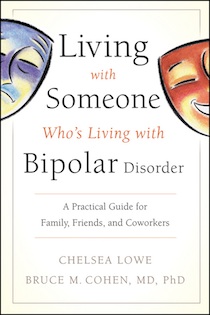 Nami’s FaithNet included a great article about faith and mental illness in the African American community. I have wanted to address this for awhile, because I have noticed the thick stigma associated with mood disorders among my African American friends, and heard the stories in the outpatient psych unit of fellow patients. Most of the African American people in my group were unable to tell anyone in their family that they were hospitalized for depression; many had no one with whom they could discuss their mood disorder.
Nami’s FaithNet included a great article about faith and mental illness in the African American community. I have wanted to address this for awhile, because I have noticed the thick stigma associated with mood disorders among my African American friends, and heard the stories in the outpatient psych unit of fellow patients. Most of the African American people in my group were unable to tell anyone in their family that they were hospitalized for depression; many had no one with whom they could discuss their mood disorder.
Click here to get to the original article by Gina Duncan, M.D., called “Faith & Mental Illness in the African American Community,” that was part of the American Psychiatric Association’s online blog called “Healthy Minds, Healthy Lives.” I have excerpted a few paragraphs.
For many in the African American community, faith is an integral part of life. In one study, approximately 85 percent of African American respondents described themselves as “fairly religious” or “religious” and considered prayer a common way of coping with stress.
My training as a psychiatrist coupled with my background enables me to have a unique perspective on the field of psychiatry as it relates to the African American community. I come from a Southern, deeply religious African American family of educators. My grandfather, a gifted musician, suffered from depression for most of his adult life. While it did not prevent him from having a successful career as a school principal, civic leader, and church member, it did prevent him from enjoying his blessings more fully. This has had a ripple effect in my family, which continues to be felt even three generations out. Fortunately, because of the struggles we observed in our grandfather, the younger members of my family have become much more vocal about our own stresses, and are determined to not let history repeat itself.
For many of us, emotional issues and mental illness are inextricably linked to issues of faith. Some may view depression as a punishment for sin, psychotic illness as the presence of demons, or anxiety as a lack of faith in God’s ability to provide. As a person of faith myself, I can say that faith provides a holistic view of life and of the meaning behind our individual experiences and struggles. However, that does not mean that we cannot make use of all the resources available to us. After all, if we have a headache we take Tylenol, right? And if your doctor tells you to take medicine for your diabetes and high blood pressure, you listen.
Some emotional problems can be fully resolved with talk therapy and support. However, more serious problems such as recurrent depression, thoughts of suicide, schizophrenia, or bipolar disorder often require medication in addition to other forms of treatment. This is an exciting time in the field of psychiatry and brain science, as we learn more and more about the biological basis of many mental illnesses. And the good news is that there are many proven, effective treatments.
* Click here to subscribe to Beyond Blue and click here to follow Therese on Twitter and click here to join Group Beyond Blue, a depression support group. Now stop clicking.

